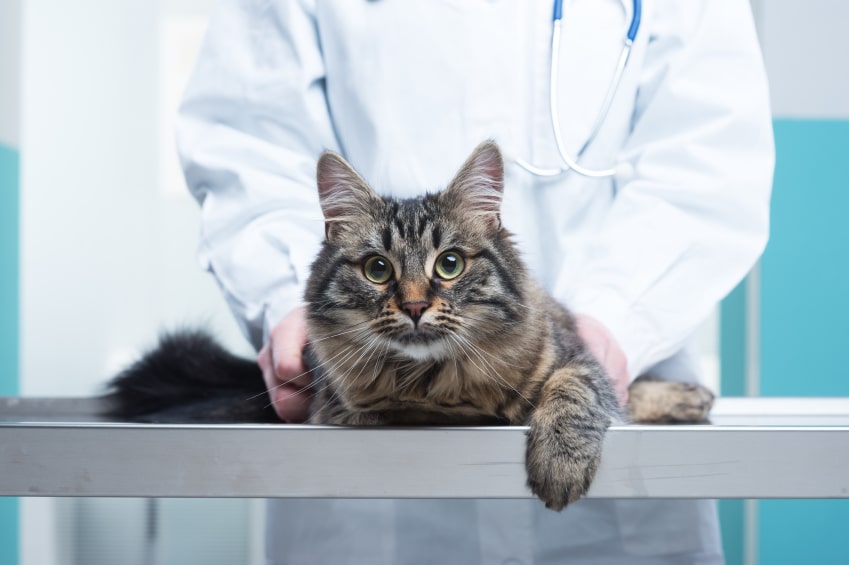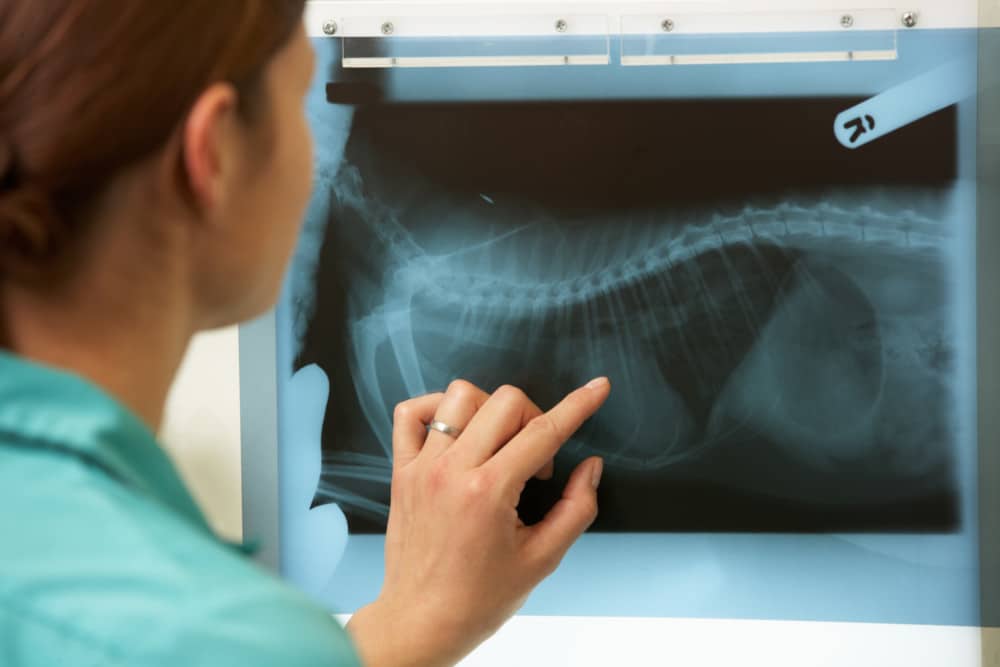
Bella is a 6-year-old long-haired cat who loves pouncing on her toy mice and napping in the sun. When Bella’s owner noticed her sleeping more than normal and not eating her entire dinner and knowing that Bella was overdue for her annual wellness visit, she scheduled an appointment with their family veterinarian. During Bella’s exam, her veterinarian suspected cardiovascular disease for the pet and detected a moderate heart murmur and congested lung sounds and recommended a cardiac workup with CVCA Cardiac Care for Pets, Austin Veterinary Emergency and Specialty Center’s service partner in pet cardiac care.
After performing a variety of tests, CVCA’s board-certified veterinary cardiologists diagnosed Bella with hypertrophic cardiomyopathy, which is the most common cardiovascular condition in cats. Additionally, Bella had developed congestive heart failure. Bella was immediately started on medications to manage both conditions and is now doing much better. Her owner was shocked to learn that Bella’s situation was so serious, since she had been acting normally until a few weeks before, and then showed only mild signs.
Bella’s story is one we commonly hear since pets—cats, in particular—are masters at hiding illness. Unfortunately, cardiovascular disease is often silent until it becomes advanced, when the situation can quickly become serious—one reason why regular veterinary wellness visits are so critical. Bella is fortunate that her owner acted quickly, but her condition may not have progressed so far had heart disease signs been detected earlier during a routine wellness visit.
If your family veterinarian detects heart disease in your pet, referral to a veterinary cardiologist can provide a better outcome. In fact, pets with congestive heart failure live 75% longer when co-managed by a board-certified veterinary cardiologist and primary care veterinarian.
Cardiovascular disease in pets
Although pets do not develop atherosclerosis or have heart attacks like people, they commonly experience a number of cardiovascular conditions, including:
- Hypertrophic cardiomyopathy (HCM) — HCM causes a cat’s muscular heart wall to thicken inward, thereby shrinking the left ventricular volume. Cats with HCM cannot pump a normal blood volume, and blood backs up in vessels leading to the heart. Sluggish blood flow can also cause a blood clot to form in the heart that can break free, become lodged in the vessels feeding the back legs and obstruct blood flow, causing sudden pain and paralysis.
- Valvular degeneration — Valvular degeneration, which typically develops in older, small-breed dogs, is the most common canine cardiovascular disease. A dog’s heart valve that degenerates no longer closes completely during contraction, and a portion of blood in the ventricle backflows, or regurgitates, into the upper heart chamber instead of leaving the heart. The backup blood flow leads to heart chamber enlargement.
- Hypertension — High blood pressure can occur as a primary problem in dogs and cats, but most commonly develops secondary to another disease, such as chronic kidney disease, diabetes, or hyperthyroidism. Hypertension can cause target-organ damage in the brain, eyes, kidneys, and heart, which can lead to serious consequences, including blindness and seizures.
- Dilated cardiomyopathy (DCM) — DCM causes the heart wall to weaken and stretch, which enlarges the heart chambers. The weakened heart muscle cannot forcefully pump blood, and the heart eventually fails. DCM typically develops in genetically prone dog breeds, such as Doberman pinschers and Great Danes.
- Congestive heart failure (CHF) — CHF is a secondary heart condition that develops when a primary disease, such as those described above, interferes with efficient blood flow through the heart, causing blood to black up in vessels leading to the heart. High pressure in the engorged vessels causes fluid to leak into the lungs, thoracic cavity, or abdomen.

Cardiovascular disease signs in pets
As with Bella’s case, pets often do not develop cardiovascular signs until their disease has advanced, which makes routine wellness care critical. Your veterinarian is trained to pick up on subtle disease signs, and routine wellness screening, such as a physical exam and bloodwork, can help them detect a problem in its early stages. As cardiovascular disease advances, your pet may develop more obvious clinical signs, including:
- Lethargy
- Tiring easily during exercise
- Coughing
- Vomiting fluid
- Difficulty breathing
- Passing out
- Blindness
If your pet develops any of these signs, schedule an appointment with your family veterinarian or your nearest emergency facility immediately, so potential heart disease can be diagnosed as soon as possible.
Cardiovascular disease diagnosis in pets
If your family veterinarian detects cardiovascular disease signs, AVES and CVCA, which is located inside our hospital, will partner with them and perform a full cardiovascular workup to diagnose and stage your pet’s disease. Diagnostic testing includes:
- Blood work
- Thoracic X-rays
- Blood pressure measurement
- Electrocardiograph (ECG)
- Echocardiogram (i.e., cardiac ultrasound)
CVCA’s board-certified veterinary cardiologists have extensive training in accurately interpreting test results to diagnose the most complex cardiovascular conditions. Additionally, they have the most advanced diagnostic equipment available, including a Philips Epiq 5C echocardiography machine, to provide accurate images and measurements of your pet’s heart and blood vessels.
Cardiovascular disease treatment in pets
Fortunately, most cardiovascular diseases can be managed and allow pets a good quality of life. CVCA cardiologists will tailor a treatment plan for your pet’s condition that will help their heart work more efficiently, and better meet their body’s oxygen demands. Your pet with CHF may also be prescribed medications to control abnormal fluid accumulation.
Successful treatment relies on early diagnosis, so keeping up with your pet’s regular wellness visits, which can allow your family veterinarian to detect a problem before it becomes a crisis, is critical.
If your family veterinarian detects cardiovascular disease in your pet, AVES and CVCA can provide the most advanced diagnostics and treatments available. We will partner with your veterinarian to help your companion enjoy the best future possible.
- Urethral Bulking for Recurrent Urinary Tract Infections in a Female Dog with Suspected Subclinical Incontinence by Tanner Slead, DVM, DACVIM - May 29, 2025
- Gastrointestinal Foreign Body by Jeremy Fleming, DVM, DACVS-SA - March 24, 2025
- Angular Limb Deformity by Russell Kalis, DVM, DACVS-SA - November 18, 2024

